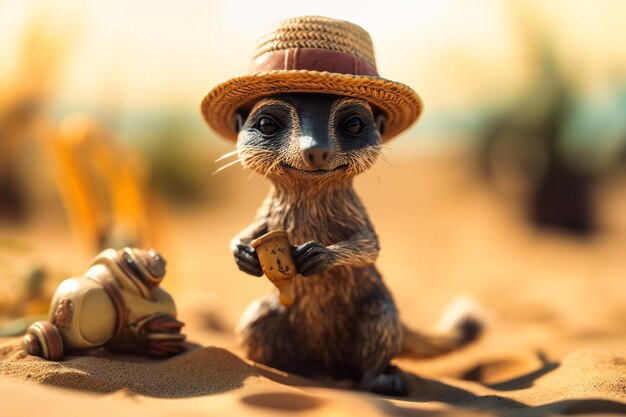10 Fascinating Meerkat Facts

Meerkats are small mammals that belong to the mongoose family.
Meerkats are known for their distinctive markings, including dark patches around their eyes.
Meerkats live in underground burrows in the deserts and grasslands of southern Africa.
Meerkats are highly social animals and live in groups called clans or mobs.
A meerkat clan can consist of up to 50 individuals.
Meerkats have excellent teamwork skills and work together to forage for food and protect each other from predators.
Meerkats have a unique alarm call system that alerts the rest of the group to potential dangers.
Meerkats mainly feed on insects, but they also eat small reptiles, birds, and eggs.
Meerkats have a specialized diet that includes scorpions, which they are immune to the venom of.
Meerkats have long, slender bodies that allow them to squeeze into tight spaces in their burrows.
Meerkats have sharp claws that help them dig and navigate through the soil.
Meerkats are diurnal, which means they are most active during the day.
Meerkats have excellent vision and can spot predators from a distance.
Meerkats have a high metabolic rate, which means they need to eat frequently to sustain their energy levels.
Meerkats have a close relationship with a small bird called the yellow mongoose, as they often share burrows and cooperate in hunting.
Meerkats have a gestation period of about 11 weeks and usually give birth to 2-4 pups at a time.
10 Fascinating Meerkat Facts part 2
Meerkat pups are born blind and rely on their parents and other members of the clan for care and protection.
Young meerkats start helping with the babysitting duties as early as one month old.
Meerkat pups are playful and enjoy engaging in wrestling matches and chasing each other.
Meerkats have a complex social structure with a dominant alpha male and female who are the breeding pair.
Meerkats have a distinct hierarchy within their clan, with other members having specific roles and responsibilities.
Meerkats exhibit various forms of communication, including vocalizations, body postures, and scent marking.
Meerkats have a lifespan of around 10-14 years in the wild.
Meerkats have adapted to living in harsh desert environments by conserving water and lowering their body temperature during hot periods.
Meerkats are known for their upright posture, where they stand on their hind legs to get a better view of their surroundings.
Meerkats have a symbiotic relationship with certain plants called euphorbias, as they use their roots for shade and protection in their burrows.
Meerkats have been featured in various documentaries and media, gaining popularity as captivating and adorable animals.
Meerkats are known to exhibit altruistic behavior, as they take turns being on sentry duty to watch for predators while the rest of the group forages.
Meerkats have a strong bond with their family members and engage in grooming behaviors to strengthen social bonds.
Meerkats have become iconic animals in pop culture, often depicted as curious and industrious characters in movies and TV shows.
Meerkats are highly adaptable and can adjust their behavior to changing environmental conditions.
Meerkats have a keen sense of smell, which helps them locate food sources and identify each other.
Meerkats have sharp teeth and powerful jaws that allow them to crack open hard-shelled prey.
Meerkats have been observed engaging in play behavior, which helps them develop important social and cognitive skills.
Meerkats have a strong sense of community and will come together to defend their territory from intruders.
Meerkats have been studied extensively by researchers to understand their complex social structure and cooperative behaviors.
Meerkats have a distinct grooming behavior known as allogrooming where they groom each other to maintain hygiene and strengthen relationships.
Meerkats have a unique way of marking their territory by using their anal gland secretions to leave scent marks on objects.
Meerkats have an incredible ability to detect vibrations in the ground, allowing them to sense the approaching footsteps of predators.
Meerkats have a playful nature and often engage in barking duels where they compete to see who can make the loudest vocalization.
Meerkats have a specialized, transparent covering over their eyes called a nictitating membrane, which protects them from dust and debris.
Meerkats have been known to exhibit mourning behaviors when a clan member dies, demonstrating their emotional capacity.
Meerkats have been used as animal ambassadors in conservation efforts to raise awareness about the importance of protecting their habitats.
Meerkats have an incredible ability to dig tunnels with their strong front claws, allowing them to create a network of underground burrows.
Meerkats exhibit a strong sense of family values, as they dedicate a significant amount of time and resources to caring for their young.